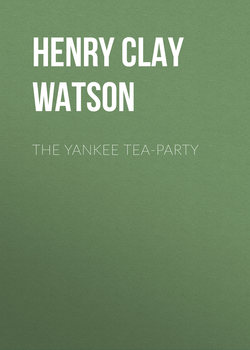The Yankee Tea-party

Реклама. ООО «ЛитРес», ИНН: 7719571260.
Оглавление
Henry Clay Watson. The Yankee Tea-party
PREFACE
INTRODUCTION
THE LEBANON CLUB
THE SKIRMISH AT LEXINGTON
FIGHT AT CONCORD
FIFER'S STORY
ARNOLD'S EXPEDITION
THE EXPEDITION AGAINST TICONDEROGA
PUTNAM'S ESCAPE
THE BATTLE OF BENNINGTON
THE CAPTURE OF GENERAL SULLIVAN
THE PATRIOTISM OF MRS. BORDEN
THE ESCAPE OF CAPTAIN PLUNKETT
THE TREASON OF RUGSDALE
THE CRUELTY OF TARLETON
LEE'S LEGION
THE ATTACK ON GENERAL WAYNE
THE MUTINY AT MORRISTOWN
THE TREASON OF BETTYS
THE BATTLE OF BUNKER'S HILL
EXPLOITS OF PETER FRANCISCO
THE EXPLOIT OF COL. ALLAN M'LEAN
THE ADVENTURE OF MAJOR LEE
GENERAL DANIEL MORGAN
THE BATTLE OF ORISKANY
CONCLUSION
Отрывок из книги
Those who have been associated in the performance of any deed of valor or patriotism ever feel attracted to each other by an influence stronger and nobler than that of friendship. The daring patriots who joined in resistance to the tyrannizing might of Britain, were men pledged to die rather than betray each other, and to maintain their rights while they could lift the sword or aim the musket; and that pledge made them look upon each other in after years, when the storm of war was hushed and security dwelt at the fireside, as brothers whom no petty cause could sunder nor ill report make foes. These remarks apply, especially, to those who first threw themselves into the breach, and resolved that, if the British ministry would adopt such measures as the stamp act, their execution should be resisted and become difficult, and if such measures were passed as the act taxing tea, coffee, and the comforts of life, that the tea should never be landed, and thus prove a loss to its owners. The men who threw the tea into Boston harbor were patriots united by a sense that union was necessary for the salvation of liberty; and they were attracted to each other by the same influence during the bloody struggle which succeeded. What wonder, then, that they loved to meet in after years, to wish each other health and happiness, and chat over the stirring events in which they had participated, and to which their first bold deed was as the spark to dry hay, kindling to a fierce blaze the ready seeds of war.
It was the fourth of July in Boston. Throughout the city which cradled the Revolution, the anniversary of the birth of the free and happy United States of America was celebrated with rejoicings unknown to the shackled people of monarchical countries. Meetings were held in various parts of the city, patriotic and democratic speeches made, bells rung, cannons fired, pistols, crackers, and fireworks of all descriptions discharged, toasts drank, and festivities of all kinds indulged. The soldiers paraded the streets with fine bands discoursing most excellent music, and followed by the usual crowd. Bunker Hill was the scene of a large patriotic meeting, and the events of the 'trying time' were again and again recounted with much enthusiasm.
.....
"Mr. Kinnison," said Mr. Colson, "there's one incident concerning that tea-party that has slipped your memory. As our procession moved from the wharf and passed the house of the tory Coffin, Admiral Montague raised the window, and said, 'Ah! boys, you have had a fine evening for your Indian caper; but mind, you've got to pay the fiddler yet!' Pitts here shouted, 'Oh! never mind, never mind, squire! Just come out, if you please, and we'll settle that bill in two minutes!' The people shouted, and the admiral thought he had better put his head in in a hurry."
"That's true," remarked Kinnison. "Well, you see, my memory is poor. Pitts would have mentioned it but for his modesty."
.....